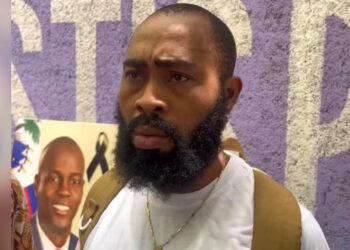In search of security, peace of mind and a more peaceful life, some Haitians are heading for the Dominican Republic, especially these days when insecurity is in full swing in the country. For more than one thing, the Dominican Republic is different from Haiti. It’s full of infrastructure. Unlike Haiti, the State takes its responsibilities seriously and works for the well-being of society.
Today, the situation is palpable. Young Haitians are leaving Haiti for the neighbouring Republic to protect themselves against bandits who sow terror, kidnap, kill and rape, all under the eyes of the authorities.
The Haitian economy is affected by this situation. Some of the immigrants we met explained that they cross the Haitian-Dominican border with the ultimate aim of improving their living conditions. Despite the disadvantages and prejudices that exist between the two peoples. We are in Santo-Domingo, precisely in Las Américas, to meet young Théragène Marly. She takes refuge in a very calm, gentle city, with beautiful buildings and road infrastructures.
Théragène Marly, aged 21, completed her secondary education in 2019 at the Institution Nouvelle Source. She spent a year studying Business Management at INUKA and, had to close her university course in order to move to the Dominican Republic due to Haiti’s socio-economic and political instability.
Marly has been living for 3 months in the land that gave birth to the Dominican dictator Raphaël Léonidas Troujillo Molina, who ordered the massacre of over 35,000 Haitians in 1937. For the time being, she is with her father, awaiting the arrival of her little sister and mother. The former student of the -Institution Nouvelle Source is taking classes and getting to know the country before joining a university.” It’s pretty interesting. The people are very friendly, at least the ones I hang out with. I feel safer and can walk the streets without worrying about kidnappers,” she says with a smile on her face.
Kora Fren-Hadaley Servius is 20 years old. Originally from Saint Marc, she has been living in the neighboring Republic for the past 3 years, studying 3rd year medicine at UTESA. Kora admits that she has done her best to adapt and get used to the local way of life. For this young girl, it’s a whole new life, another language, new cultures and even more racism”, she explains.
“Life there is very difficult especially for students from elsewhere, we depend precisely on our parents, we also fight racism even in the classroom with teachers and students. Even renting a house is not easy. More often than not, we meet people who tell us “our houses aren’t for foreigners”, yet for other nations, if and immediately, we can understand when they say foreigners, they’re referring to Haitians. It’s not very easy. I’m speaking as a student,” says Kora.
“Despite the discrimination, it’s rather one of the developing countries that I admire. They have good plans not only for their people, but also for foreigners. A country like other poor countries with a high rate of all, insecurity, unemployment, fraud, ect. But the politicians are working for the benefit of the people”, says Fabiola, a student in Civil Engineering.
“Total discrimination against Haitians. They can’t work, unless it’s a call center. However, tourism brings in a lot of money. And to meet some of my obligations, I buy and resell products in Haiti,” says Sabrina Saint Cyr, a Farmaco biochemistry student at UTSA.
The reality is very different from what you might think. Some people give the impression that life is very easy and everything is at their disposal. According to the former student of Institut La Sève Sterline, life in the Dominican Republic is very complicated and hard.
Most Haitians living there depend on someone abroad. “Either they have their own funds, or they have a relative living in the United States who supports them,” says Théragène Marly.
“I’m under the responsibility of my dear parents. There are some who work, but work for a student isn’t as easy, only as a call center and in my experience, you can’t count on a job like that, because at any moment, things can change,” reacted medical student Kora.
Sterline continues, “They can do anything to meet the demands of life, and that’s the sad part: Haitians don’t help each other, or at least Haitians don’t help their compatriots. They can live in shared flats and work for the Chinese for a pittance, or those who are lucky and/or speak English can find a job as a clandestine call center operator”.
The Dominican Republic is the new land coveted by some Haitians for a better tomorrow and a new perspective. They’re ready to live, despite all the disadvantages.
Fabiola and Sterline: borrowed names





Discussion about this post